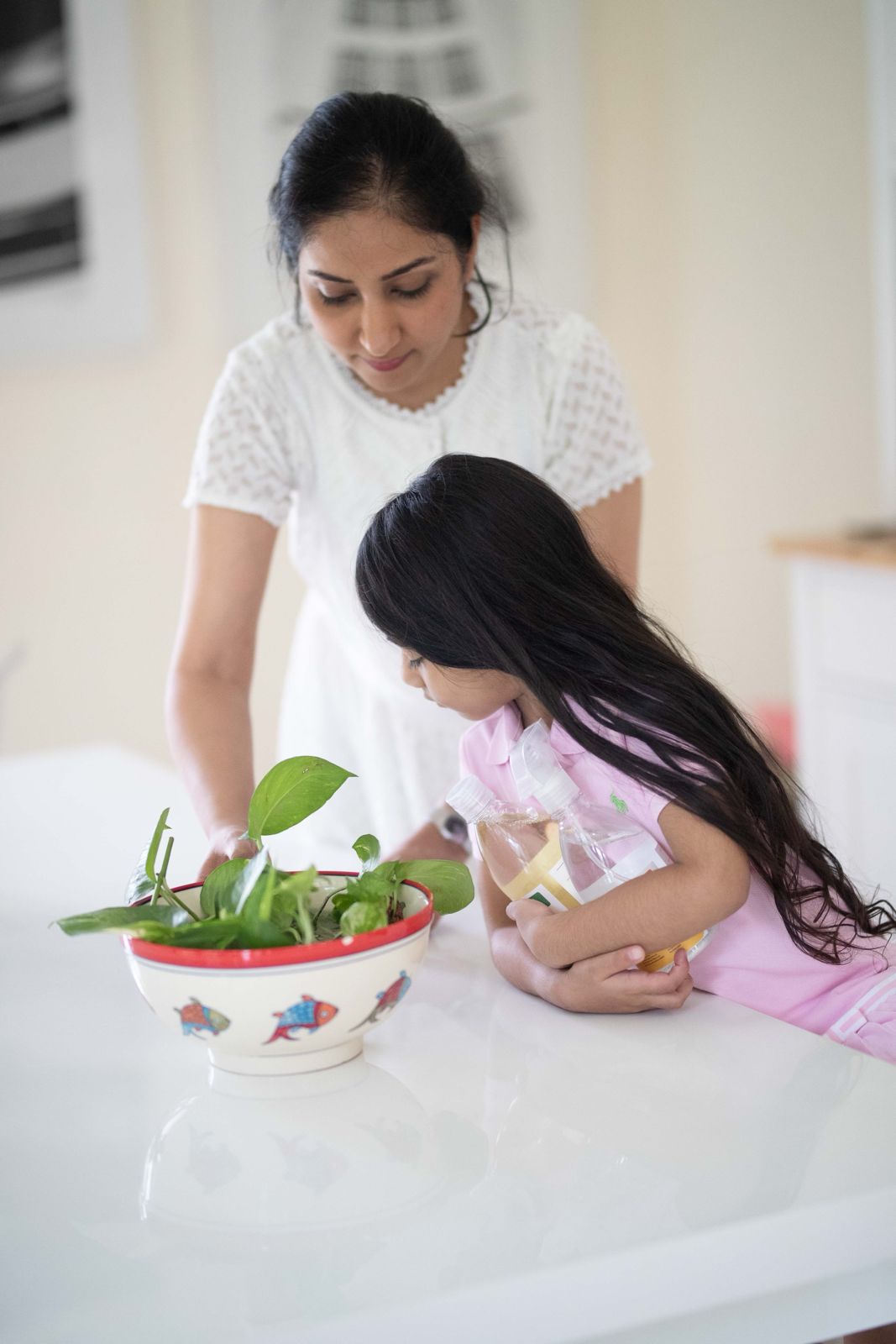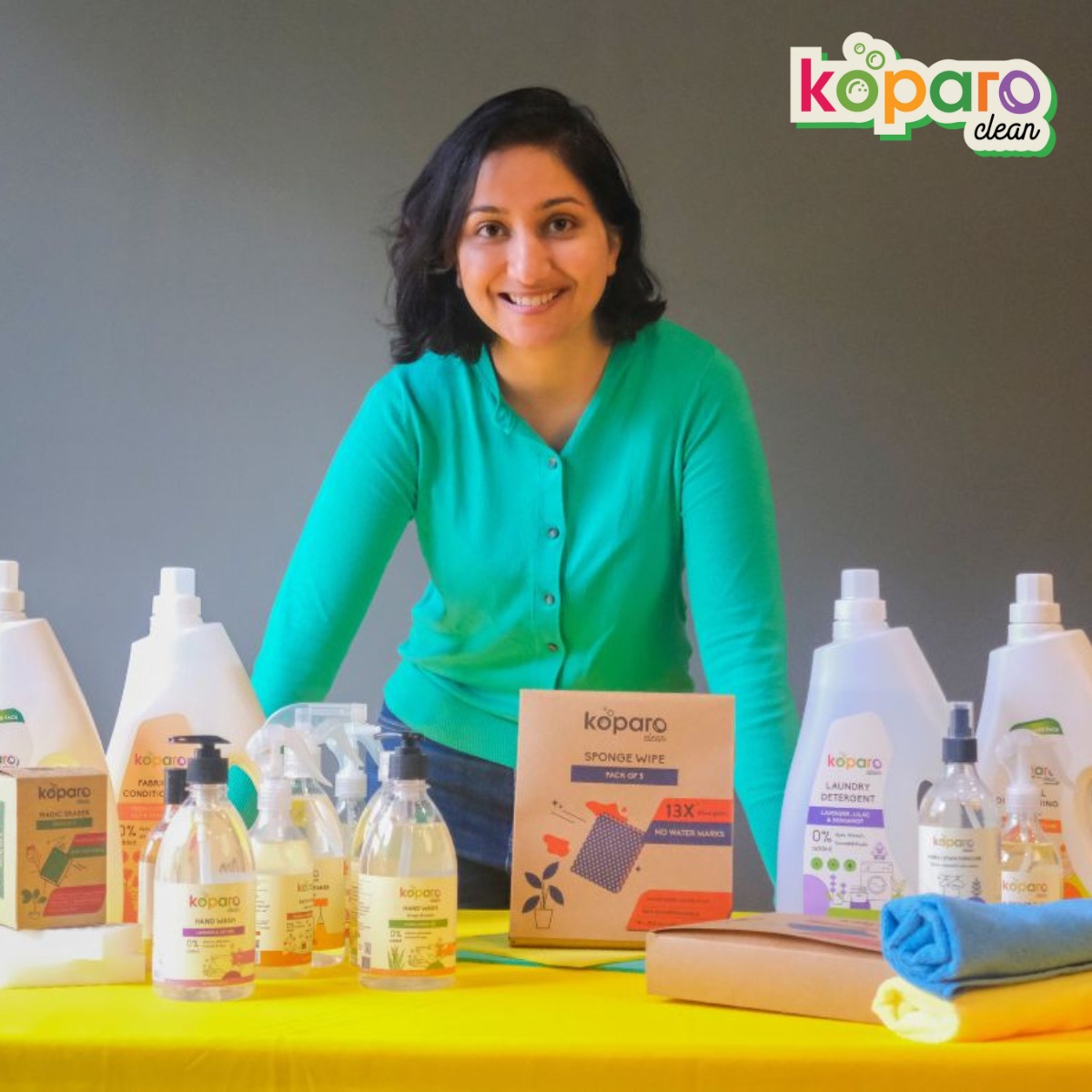Let’s turn back the clock, approximately three years. On 22 March, 2020, India entered its first pandemic-induced lockdown, restricting us all to our homes. It was a period when families came together to cook, clean, and tackle household chores collectively. Even the children, with their newfound time at home, lent a helping hand.
A similar scene unfolded at Simran Khara’s house in Delhi. The 42-year-old, along with her husband and their then five-year-old daughter, spent much of their time on household chores. After a few days, Simran started studying the labels of the dishwashing and floor cleaning products she was using at home. She recognised the presence of harmful chemicals in these cleaners, which posed risks to her daughter and even the surfaces they cleaned.
No longer at ease with her daughter participating in cleaning activities due to the potential exposure to these toxic chemicals, Simran, a concerned mother — and an MBA graduate with 14 years of corporate experience — resolved to develop a line of eco-friendly home cleaners that would prioritise child and pet safety.
After months of research, Simran Khara, the former CEO of Juggernaut Books, launched Koparo Clean in February 2021. Koparo Clean is a home-care product brandboasting of “natural” formulations crafted from plant-based ingredients such as coconuts (kopra).
Her entrepreneurial journey gained national attention when she appeared on Shark Tank Season 3, where she secured a substantial investment of Rs 70 lakh from ‘Sharks’ Vineeta Singh and Aman Gupta.
In search of a toxin-free cleaning product

So, what’s so wrong with the cleaners we use now?
The conventional cleaning products commonly used in households — particularly floor cleaners, dishwashing liquids, and laundry detergents boasting of clothes whitening capabilities — typically contain a combination of cleaning agents, fabric whiteners, sodium silicate, and sodium sulfate. A study published in Chemosphere scrutinised 30 such cleaning products and revealed that they may emit hazardous volatile organic compounds (VOCs).
This analysis highlighted that many of these VOCs pose serious health risks, including damage to the respiratory system, heightened cancer susceptibility, and adverse effects on developmental and reproductive health. Furthermore, a report by the Environmental Working Group (EWG) cautioned that the fumes emanating from certain cleaning products could trigger asthma attacks.
Simran recounts that during the first 10 to 12 weeks post-lockdown, she, like many other mothers, found herself relying heavily on cleaning products at home. She scrubbed surfaces multiple times to maintain a COVID-19-free environment. “We were using cleaning liquids for washing our vegetables, fruits and everything else at home,” she shares.
However, as hygiene took centre-stage, was it unknowingly causing more harm than good?
A careful assessment of multiple research papers made Simran get up and take action. She looked for safer alternatives, but couldn’t find many, especially at the same prices as the regular cleaning products.
“I was becoming more aware of ingredients. Discovering many chemical names in everyday products was triggering for me, as they posed harm to my daughter. While doing home cleaning, I had a first-hand experience of how it was affecting my hands. I could see exactly what was being put in the bucket,” Simran notes.
She explains that she realised that most conventional cleaners were laden with toxins. Unable to find any alternatives, she set out on a mission to develop products that would provide reassurance to mothers like herself.
Teaming up with an R&D lab in Bengaluru, she focused on formulating products that omitted seven chemicals known to be linked to health issues — ammonia, chlorine, phosphates, EDTA (Ethylenediaminetetraacetic acid), bleach, triclosan, and artificial colours.
While she wanted her brand to be natural, she knew the cleaners had to be able to dislodge dirt effectively. So finding the right formulations turned out to be a time-consuming and expensive process. “At the heart of every cleaning product is the surfactant which dislodges grease and dirt,” she shares, adding. “We had to look for non-synthetic options for this.”
Simran eventually discovered the solution in surfactants derived from coconut and sugarcane, inspiring the name ‘Koparo’.

Koparo’s products blend these surfactants with organic bio-enzymes and essential oils. After six months and 10 prototypes per product, they finally arrived at the winning combinations. The lab rigorously tested the efficacy of the products, and on 4 February, 2021, Koparo launched four products — floor cleaner, all-purpose spray, hand wash, and dishwash.
Yet another aspect that Simran says she stayed away from is artificial colours. “We believe in transparency and don’t hide behind coloured packaging. We use no colours and are open about the ingredients we use. Additionally, our products are also 100% made in India,” she says.
She shares that she was also irked by the advertising claims promising “a bloom of roses” in your floor cleaner or the “whiteness” and the “power of a hundred lemons” in various products. “We don’t make any fake promises. Our products do what any cleaner is supposed to — clean effectively. I just want people to choose better. Read the ingredients, know what you are using and what you’re letting your children use,” she adds.
Koparo has 30 SKUs (stock-keeping units) and its hero product is the dishwash liquid. Apart from that, their liquid detergent, floor cleaner and hand wash are fast sellers. The products are made in factories in Gujarat and Maharashtra, and their bottles are recyclable.
An Indian brand solving India’s cleaning problems

Following the launch, Simran shares that the first year witnessed sluggish growth. They debuted on their website and ran some advertisements on Facebook to attract customers, encouraging them to reconsider their current dishwashing habits.
“We had to create a new supply chain which required a lot of money and time. We worked with different ingredients to formulate the perfect product. We had to invest a lot to build our inventory in the beginning and find the right manufacturers,” says the Delhi resident.
The ISB MBA graduate bootstrapped the business and invested almost Rs 55 lakh. Despite facing many challenges, she believes that big risks begets big rewards. “You experiment, fail, learn, and restart. But don’t be paralysed with fear. Many mentors are willing to help and give insights into the industry; there’s never been a better time to be a startup. The ecosystem is rich, dynamic, and has a lot to offer,” she adds.
The financial and time investments paid off, as by the second year, they started growing and found their customer base in millennials, parents, pet parents, and people moving towards a sustainable lifestyle. They also expanded into quick commerce.
Presently, they receive 400 to 500 orders per day on their website and boast a monthly sales figure of Rs 3 crore, with an expected revenue of Rs 12 crore for the current year.
Additionally, Simran made an appearance on Shark Tank India Season 3 and secured a deal worth Rs 70 lakh for 1 percent equity with Vineeta Singh and Aman Gupta. The sales have significantly increased since the episode aired nearly two weeks ago.
“We want to spearhead a movement that is better for you, your kids, and the planet. We want to redefine cleaning and become the top choice for cleaners,” Simran concludes.
Edited by Pranita Bhat
No comments:
Post a Comment